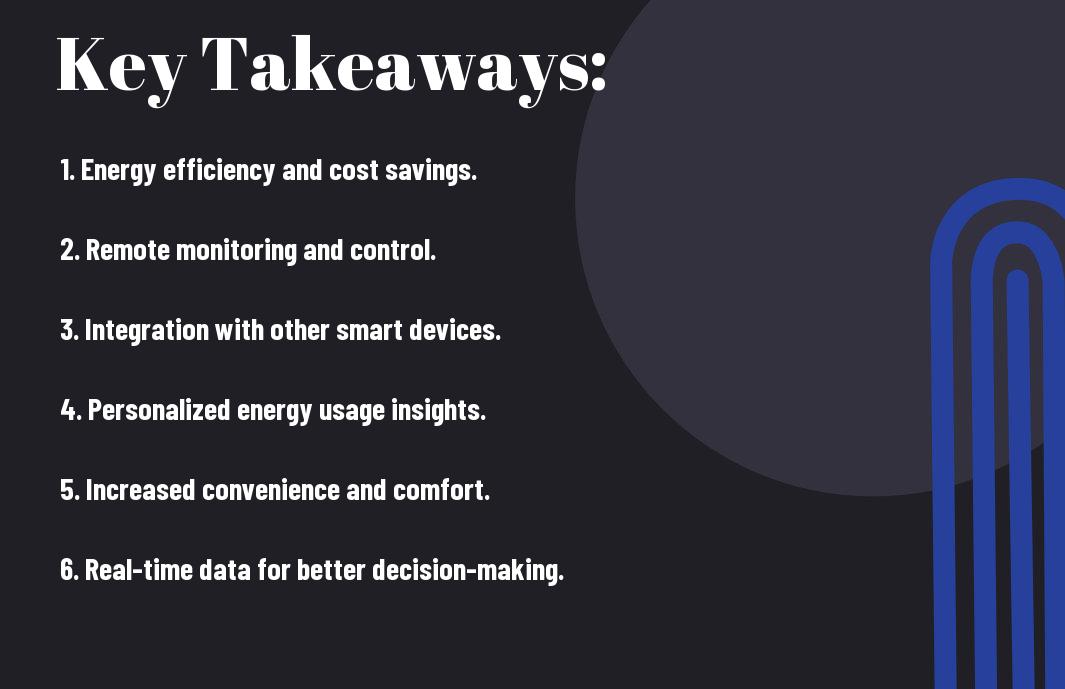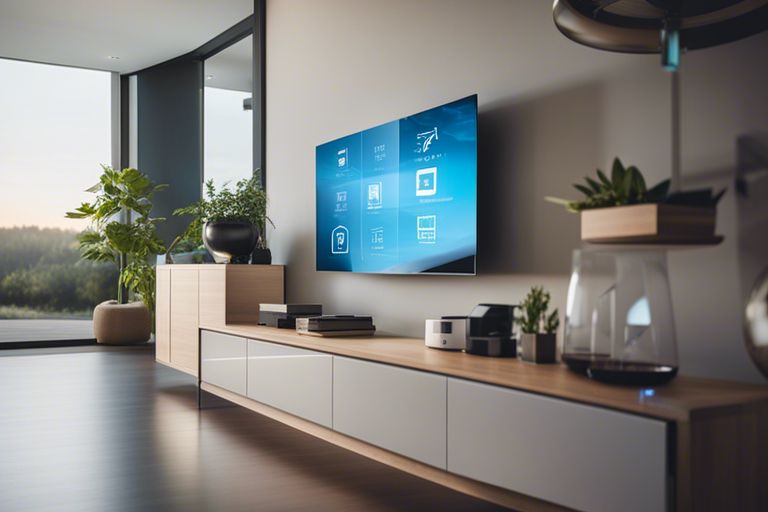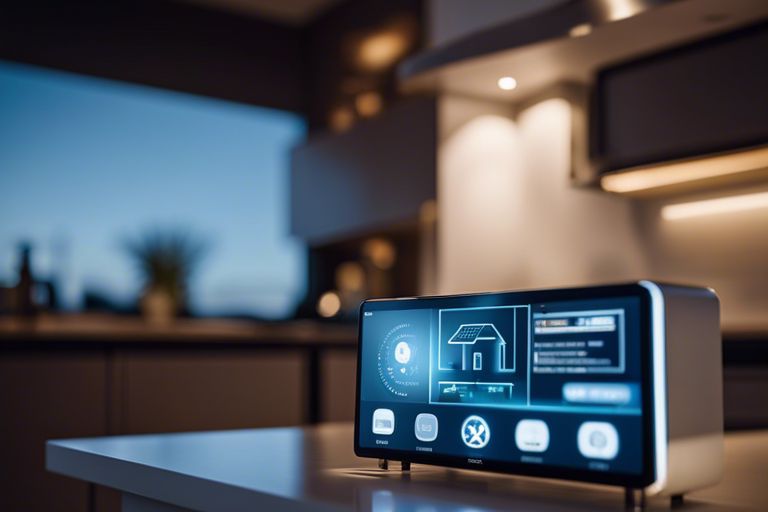Automation in smart home energy management systems has greatly advanced with the integration of the Internet of Things (IoT). This revolutionary technology enables smart devices to communicate, collect, and analyze data in real time, resulting in efficient energy consumption and cost savings for homeowners. In this blog post, we will explore the benefits that smart home energy management systems derive from IoT, such as remote monitoring, predictive maintenance, and energy optimization. To learn more about the advantages of leveraging IoT in energy management systems, check out our Benefits of Energy Management using IoT blog post.

The Symbiosis of IoT and Smart Home Energy Management
Real-Time Monitoring and Control
With the integration of IoT in smart home energy management systems, real-time monitoring and control have become more efficient than ever. Homeowners can now track their energy consumption instantly and make adjustments as needed to optimize their usage and reduce costs. This level of control allows for a more sustainable and eco-friendly lifestyle.
Learning Algorithms and Predictive Analytics
Any smart home energy management system worth its salt utilizes learning algorithms and predictive analytics to forecast energy patterns and provide insights for more informed decision-making. These advanced technologies analyze historical data to predict future consumption, enabling homeowners to preemptively adjust their settings for maximum efficiency.
Another crucial aspect of learning algorithms and predictive analytics is their ability to adapt to changing circumstances. These systems can learn and evolve over time, continuously improving their accuracy and efficiency in managing energy consumption. By taking into account variables such as weather conditions, occupancy patterns, and appliance usage, these algorithms can anticipate and optimize energy usage in ways that were previously unimaginable.
Enhancing Energy Efficiency
IoT for Optimizing Consumption
While the concept of smart home energy management systems is not new, the integration of Internet of Things (IoT) technology has revolutionized the way energy consumption is optimized. IoT devices can now monitor and analyze energy usage in real time, allowing homeowners to make informed decisions on when and how to use their appliances to maximize efficiency.
The Impact on Renewable Energy Integration
On the frontier of energy sustainability, the integration of smart home energy management systems with renewable energy sources is a game-changer. Renewable energy sources like solar panels or wind turbines can now be seamlessly integrated with IoT technology to ensure maximum utilization and efficiency. This not only reduces dependency on traditional fossil fuels but also paves the way for a greener future.
A crucial aspect of this integration is the ability of IoT devices to adjust energy consumption based on the availability of renewable energy sources. This dynamic optimization ensures that excess energy produced during peak times can be stored for later use or diverted back to the grid, contributing to a more stable and sustainable energy ecosystem.
User Experience and Automatization
Customization and User Comfort
Now, when it comes to smart home energy management systems, customization plays a vital role in enhancing user comfort. With IoT technology, users can personalize their settings to align with their preferences, creating a more tailored and comfortable living environment. Whether it’s adjusting the temperature, setting lighting schedules, or optimizing energy usage based on daily routines, customization options ensure a seamless and enjoyable experience for homeowners.
Remote Access and Smart Devices
On any given day, the ability to access and control your smart home devices remotely through IoT connectivity is a game-changer. Whether you’re at work, traveling, or simply on the go, remote access empowers users to monitor and manage their energy consumption in real time. By syncing smart devices with the system, homeowners can remotely turn off unused appliances, adjust thermostat settings, and even receive alerts about energy usage, enhancing convenience and energy efficiency.
Any reliance on remote access allows homeowners to stay connected and in control, ensuring energy savings and preventing wastage. With the help of IoT-enabled smart devices, users can manage their home energy consumption from virtually anywhere, making adjustments to optimize efficiency and comfort. Additionally, remote access fosters peace of mind, as users can monitor and secure their homes even when away, providing added security benefits.

Security and Data Management in IoT-Empowered Smart Homes
Protecting User Data and Privacy
Many smart home energy management systems rely on IoT devices to collect and analyze data to optimize energy usage. Management of user data and privacy is crucial in ensuring that sensitive information is not compromised. By implementing robust encryption protocols and secure data storage practices, smart home systems can safeguard user data from potential cyber threats.
Ensuring System Reliability and Safety
Many IoT-empowered smart home energy management systems are designed to enhance convenience and efficiency. IoTEmpowered However, it is imperative to prioritize system reliability and safety to prevent malfunctions or accidents that could result from system failures. With regular system updates, security audits, and adherence to industry standards, smart home systems can ensure optimal performance and minimize potential risks.
Challenges and Future Perspectives
For Key Benefits and Use Cases of IoT Energy Management, smart home energy management systems face various challenges and hold promising future perspectives. These challenges include technological and infrastructural hurdles that need to be overcome for widespread adoption.
Technological and Infrastructural Hurdles
Perspectives in this area are crucial to address the complexities of integrating IoT devices seamlessly with existing home energy management systems. The deployment of sensors and smart devices at scale requires robust infrastructure and interoperability standards to ensure data accuracy and security.
The Role of Policy and Regulation
Perspectives on policy and regulation underscore the critical importance of a regulatory framework that promotes innovation while safeguarding consumer rights and privacy. Harmonizing global standards and regulations can enable interoperability and data sharing while mitigating cybersecurity risks.
Regulatory support for incentivizing energy-efficient technologies and practices can accelerate the adoption of smart home energy management systems, leading to greater sustainability and energy savings for consumers.
Final Words
From the above Smart Home Energy Savings: Reduce Costs with IoT, it is evident that smart home energy management systems greatly benefit from IoT by providing real-time data and insights for optimizing energy usage. By leveraging IoT technology, these systems can help homeowners reduce their energy consumption, lower utility bills, and contribute to a more sustainable environment. With continuous advancements in IoT technology, the potential for smart home energy management systems to improve efficiency and convenience will only continue to grow. Embracing these innovations can lead to a brighter and more energy-efficient future for us all.
How Do Smart Home Energy Management Systems Utilize IoT Technology for Maximum Efficiency?
Smart home energy management systems utilize IoT technology to maximize efficiency by integrating with various devices and sensors to monitor and control energy usage. This allows them to optimize heating, cooling, lighting, and appliance usage, ultimately reducing energy consumption and costs. Additionally, they can also connect with renewable energy sources, such as wind turbines and IoT technology, to further enhance sustainability and efficiency.
FAQ
Q: How do smart home energy management systems benefit from IoT?
A: Smart home energy management systems leverage the Internet of Things (IoT) to efficiently monitor and control energy usage within the home. IoT devices collect real-time data on energy consumption, enabling smart management decisions to optimize energy usage and reduce costs.
Q: What is the role of IoT in improving energy efficiency in smart homes?
A: IoT technology enables smart home energy management systems to analyze energy patterns, detect inefficiencies, and automate adjustments to ensure optimal energy usage. This results in reduced energy waste and lower utility bills for homeowners.
Q: How does IoT integration enhance the sustainability of smart home energy management systems?
A: By allowing devices to communicate and coordinate with each other, IoT integration in smart home energy management systems promotes eco-friendly practices such as load balancing, renewable energy utilization, and peak-time energy optimization, contributing to a more sustainable energy ecosystem.
Q: What are the benefits of real-time monitoring provided by IoT for smart home energy management?
A: Real-time monitoring through IoT devices enables homeowners to track their energy usage, identify trends, and receive alerts about potential energy wastage. This proactive approach empowers users to make informed decisions to conserve energy and adopt energy-efficient behaviors.
Q: How do smart home energy management systems leverage IoT for remote access and control?
A: IoT connectivity allows for remote access and control of smart home energy management systems via mobile devices or computers. Users can adjust settings, monitor energy consumption, and schedule tasks from anywhere, enhancing convenience and enabling efficient energy management even when away from home.



